Why did Hitler hate Jews – Shocking Truth
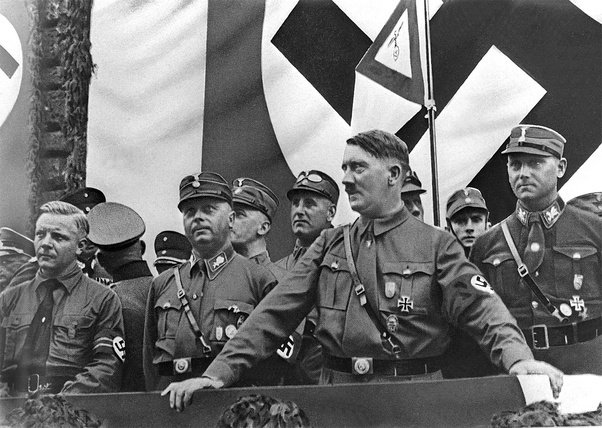
Hitler hated Jews for sure & whole world knows this but Why did Hitler hate Jews – Read below for detailed explanation
As one of history’s most reviled figures, Adolf Hitler remains the subject of grim fascination, with the details of his life revealing a troubled, complicated figure. Here are 10 facts about him.
Hitler did not invent the hatred of Jews. He capitalised on antisemitic ideas that had been around for a long time.
About Hitler – Why did Hitler hate Jews
Antisemitism played a major role in Adolf Hitler’s thinking and in the Nazi ideology. Read here what inspired Hitler’s hatred of Jews and what life events played a role in its development.
Antisemitism: an age-old phenomenon
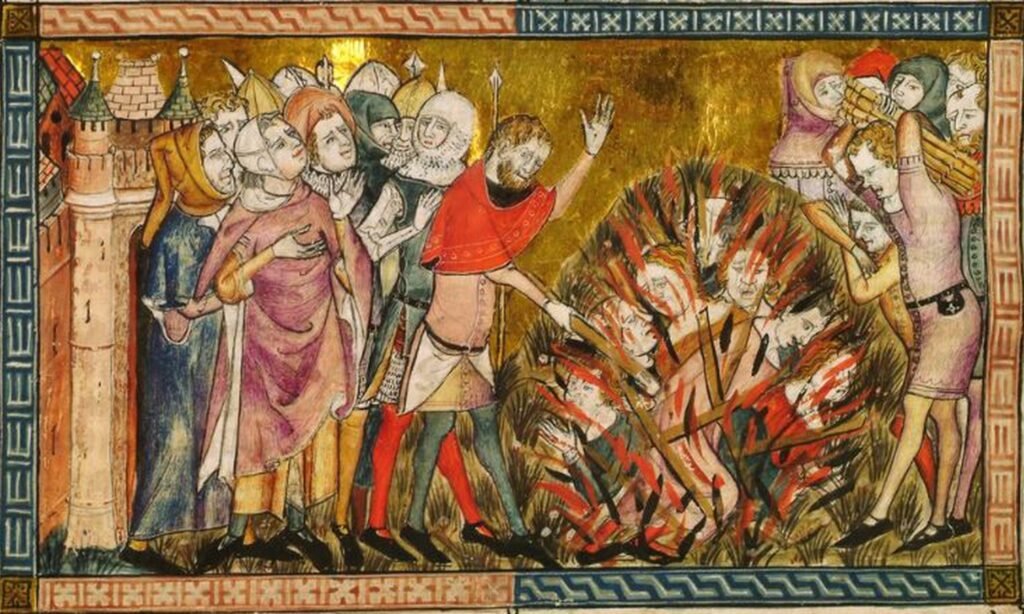
Hitler did not invent the hatred of Jews. Jews in Europe had been victims of discrimination and persecution since the Middle Ages, often for religious reasons. Christians saw the Jewish faith as an aberration that had to be quashed. Jews were sometimes forced to convert or they were not allowed to practise certain professions.
In the nineteenth century, religion played a less important role. It was replaced by theories about the differences between races and peoples. The idea that Jews belonged to a different people than the Germans, for instance, caught on. Even Jews who had converted to Christianity were still ‘different’ because of their bloodline.
Hitler was born in Austria in 1889. He developed his political ideas in Vienna, a city with a large Jewish community, where he lived from 1907 to 1913. In those days, Vienna had a mayor who was very anti-Jewish, and hatred of Jews was very common in the city.
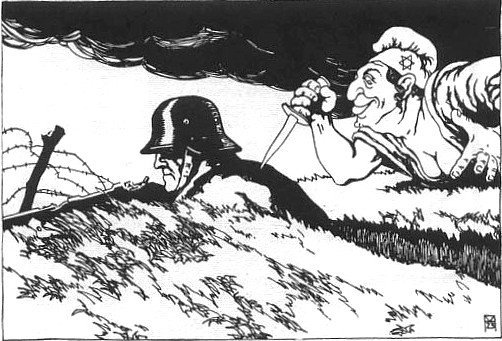
During the First World War (1914-1918), Hitler was a soldier in the German army. At the end of the war he, and many other German soldiers like him, could not get over the defeat of the German Empire. The German army command spread the myth that the army had not lost the war on the battlefield, but because they had been betrayed. By a ‘stab in the back’, as it was called at the time. Hitler bought into the myth: Jews and communists had betrayed the country and brought a left-wing government to power that had wanted to throw in the towel.
By blaming the Jews for the defeat, Hitler created a stereotypical enemy. In the 1920s and early 1930s, the defeated country was still in a major economic crisis. According to the Nazis, expelling the Jews was the solution to the problems in Germany.
This political message and the promise to make Germany economically strong again won Hitler the elections in 1932. After he had come to power, the laws and measures against the Jews increased all the time. It ended in the Shoah, the Holocaust, the murder of six million European Jews.
Hitler’s racism: not just the Jews
Hitler viewed the world as an arena for the permanent struggle between peoples. He divided the world population into high and low races. The Germans belonged to the high peoples and the Jews to the low ones. He also had specific notions about other peoples. The Slavic people, for instance, were cast as inferior, predestined to be dominated.
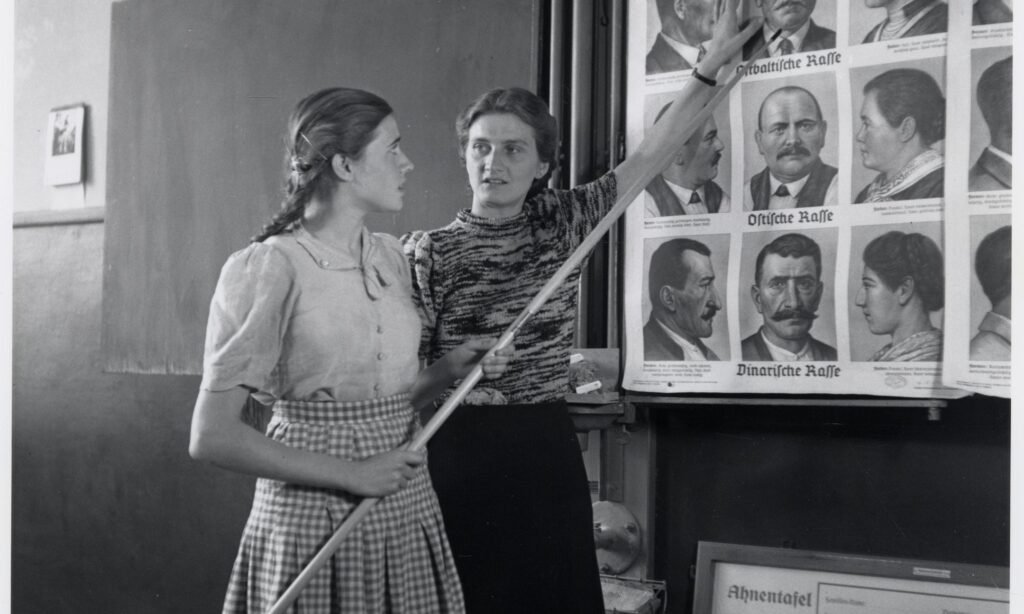
Hitler felt that the German people could only be strong if they were ‘pure’. As a consequence, people with hereditary diseases were considered harmful. These included people with physical or mental disabilities, as well as alcoholics and ‘incorrigible’ criminals. Once the Nazis had come to power, these ideas led to the forced sterilisation and killing of human beings.
2 Theories Why Did Adolf Hitler Hate the Jews?
Source: haaretz.com
Although much of Adolf Hitler’s political manifesto, ‘Mein Kampf,’ was devoted to explaining that hatred, researchers have looked for a more personal explanation.
One can’t consider the Holocaust without wondering about the source of Adolf Hitler’s hatred for the Jews. Although much of his political manifesto, “Mein Kampf,” was devoted to explaining that hatred, which was clearly shared by an enthusiastic German nation, the actions taken against Europe’s Jews were so monstrous in both nature and scale that it was inevitable that researchers would look for a more personal explanation.
Theory #1 Illegitimate father
Even before Hitler came to power, there were rumors that he was of Jewish descent, a detail of personal history that would be highly damaging, even humiliating to him, and which he went to lengths to quash. The idea derived from the fact – not a secret – that his father, Alois Hitler, was illegitimate. Although Hitler’s paternal grandmother, Maria Anna Schicklgruber, eventually married Johann Georg Hiedler and took his surname, Alois was already aged five when she did so, and she never did reveal, if indeed she knew, who his father was.
Naturally, there was much speculation about the identity of Hitler’s grandfather – most of it centered on Johann Georg Hiedler himself and his brother, Johann Nepomuk Hiedler, who was the stepfather of Alois, and who left him part of his estate when he died.
In any event, the connection between having an embarrassing ancestor in one’s family tree to possessing a pathological hatred of that ancestor’s ethnic group is far from obvious.
Theory #2 The physician
Another well-known theory concerns the Jewish physician, Eduard Bloch, who cared for Hitler’s beloved mother, Klara Hitler, before her death from breast cancer, in 1907, at age 47. By the time Klara’s condition was diagnosed, it was incurable, but Dr. Bloch, at her son’s insistence, treated her for more than a month with a quasi-experimental medication called iodoform. The medication caused her excruciating pain, but did not extend her life.
Could the Holocaust have been Hitler’s revenge on Dr. Bloch for his inability to save Klara’s life?
Certainly at the conscious level, Hitler did not hold Bloch responsible for his mother’s suffering. After her death, he actually wrote to Dr. Bloch thanking him for his devoted care. Three decades later, in post-Anschluss Austria in 1938, when Bloch wrote to the chancellor asking for help, Hitler arranged for him to be spared the harsh measures being taken against Jews until he could make arrangements to emigrate to the United States, where he died in 1945.
Other Side of the Story : Why Hitler Hated Jews so much?
In his youth, Hitler was no more anti-Semitic than your average Austrian. Europe was generally pretty darn anti-Semitic, so he likely viewed Jews as the “other,” but he was not yet on a path to pursue their extermination, nor was he particularly obsessed with race.
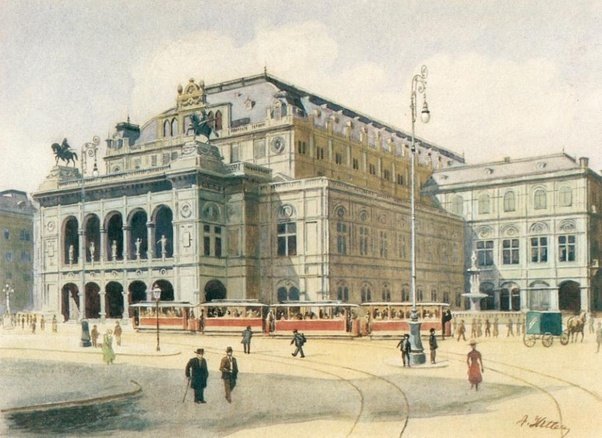
As a teenager and young man, Hitler’s thoughts were on dramatic music and art, not orchestrating genocide.
However, Hitler’s passion for music and art could not magically produce the level of talent he needed to get into the art school he wanted- he wasn’t quite good enough to be a “certified” artist in Austria.
Hitler would not be the great artist he had imagined, and he soon fell into despair and homelessness.
Life was harsh for the young Hitler, and it hardened him.
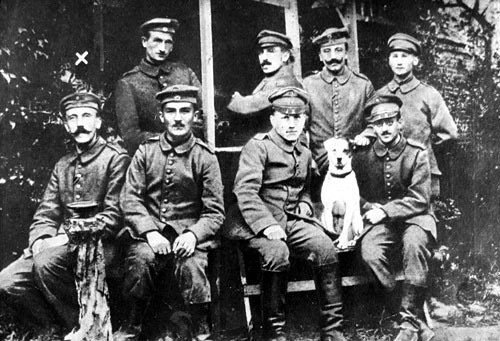
I owe it to that period that I grew hard and am still capable of being hard.
Soon, Hitler became very interested in politics. He would study and then engage others in debate at his home for impoverished men. He would annoy his housemates with long political diatribes and monologues in between painting small postcards to make a meager income. He would take to the streets and watch the major parties debate and fight, then spend hours speaking with (at) whomever was in earshot.

Soon, he had built the foundation of his political convictions- a naive and tragically misguided mix of nationalism and anti-Semitism.
Before the seed of Hitler’s hatred for the Jews could properly germinate, he found a new calling to distract him from poverty and political debate- war.
When the Great War began, Hitler became a German soldier (Austro-Hungary didn’t accept him). He had failed in his dreams to be an artist and suffered poverty and homelessness, but his adoptive nation was enabling his new dream and giving him a chance to regain his pride.
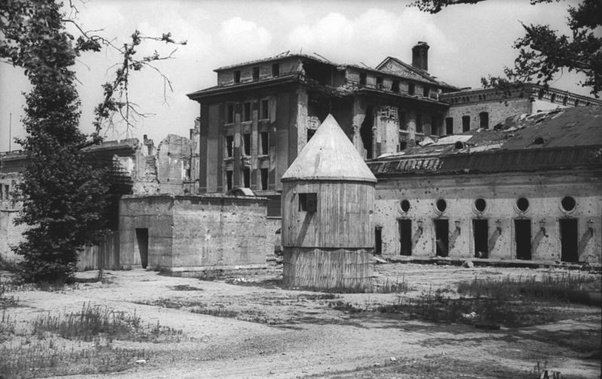
It was at this time that Hitler became even more fiercely pro-German and nationalistic, defining everything in the context of his (adopted) Fatherland.
When the war was lost, Hitler (along with many German soldiers) felt betrayed. “Germany had not lost a decisive battle in the field- it had given up from home!”
It was after Germany’s catastrophic defeat that Hitler began in earnest his path toward the Holocaust.
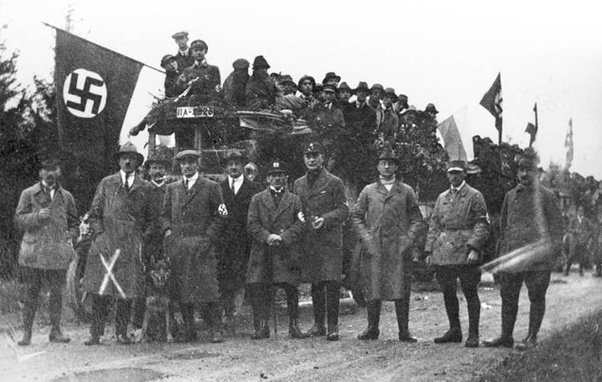
Following the war, there was an incredible amount of civil unrest and violence. The fledging Weimar Republic could not weather the storm of Communist and Fascist violence. The military was desperate to prevent radical groups from attacking the government. They sent a young veteran- Hitler- to spy on one of these groups (The German Workers’ Party).
Sent to spy, Hitler quickly became a convert. The conspiracy theories of these coffee table intellectuals- that Jews and bankers and Communists were actively conspiring to sabotage the German people and destroy the “German race-“ fit perfectly with Hitler’s evolving (very twisted) world view.
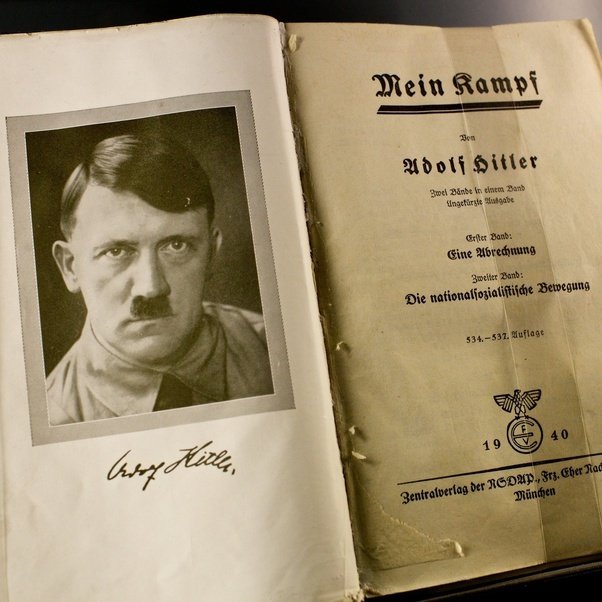
It was at Landsberg that Hitler had time to refine and perfect his twisted view of the world. It’s where the anti-Semitism you recognize today as “Hitler” fully formed.
Hitler convinced himself that the enemy was “Jewish Bolshevik Communism,” tying all his enemies up in a nice, neat, deluded package. It was the Communists, orchestrated by a secret cabal of Jews who ruled the world, who were planning Germany’s destruction. Russia- the Soviet Union- was the heart.
Of course, Hitler argued about Lebensraum, but expanding into new lands was part and parcel with eradicating “Jewish Bolshevik Communism” and his enemy in the East- Russia.
He put all his twisted notions into a book, complete with the fiction of a madman and the eloquence of a gorilla.
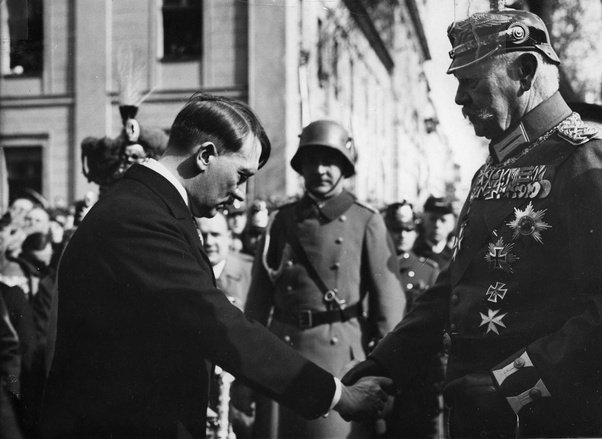
He finally succeeded in the early 1930s, taking power. A few years later, he had near total power.
A short time after, he began testing the will of the German people to follow him into the abys
Not long after, Hitler invaded Poland and started World War II, and for nearly 5 years he worked tirelessly to exterminate the Jewish people. He even took steps that adversely affected the war effort in a desperate effort to fulfill his “Final Solution.”
Thankfully, evil found its end here:
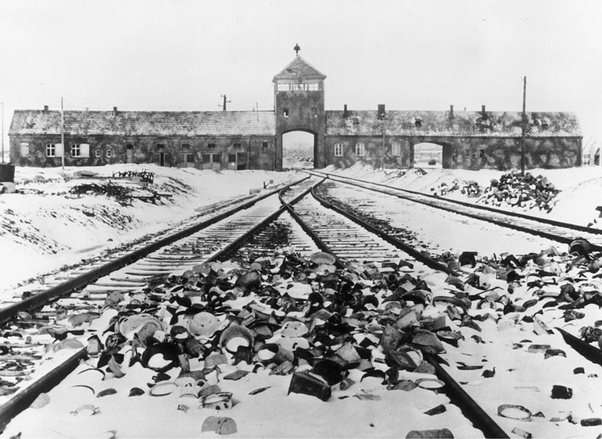
Why did Hitler hate Jews so much that the Holocaust happened?
It was failure and hardship in youth, which made him resent those in power and those who had enjoyed success in society (and also perhaps damaged him psychologically). However, his intense nationalism (which came later) would not allow him to blame German society or the German people- it had to be some “other” that authored society’s inequalities and failure.
His early political convictions were heavily influenced by anti-Semitic writers and figures, in a nation rife with anti-Jewish publications and crackpot theories about an imagined Jewish menace.
The Great War tempered his nationalism, defeat his conviction that it must be some “other” that was destroying Germany and working to prevent Her (His?) greatness.
It’s possible Hitler’s exposure to gas near the end of WWI and subsequent trauma caused psychological damage- opened the cage containing his darker demons.
Anti-Semitic fantasy discussions between coffee-table intellectuals in a failing debate club were all the confirmation a disenchanted and cynical Army officer needed that he was on the right path.
Time in prison, surrounded by yes-men and his own psychosis, reinforced Hitler’s (irrational) hatred of the Jews.
Growing paranoia about the “Bolshevik Jewish threat” led Hitler to pursue all possible means of Jewish extermination, starting with the revocation of rights of Jewish German citizens and culminating in the horrific and systematic murder that was the Holocaust.
A complicit German society made it all possible.
Source: Originally answered on Quora
Well now If i have to answer, Did Hitler only hate Jews?
No, He hated Romany (gypsies), Slavs, Homosexuals, Communists, Socialists, Democrats, Pacifists, “Misfits”, “Miscegenators” and Everybody who didn’t like him!
5 Fast Facts about Hitler
Since I already explained you Why did Hitler hate Jews above, here’re 5 Facts about Hitler you can mind knowing.
1. He was Austrian
The fact that Hitler was Austrian, born in Braunau am Inn in April 1889, might seem odd given his association with German nationalism. This affinity was not, however, all that unusual among Austrians.
2. He was a frustrated artist
It’s tempting to wonder how different the 20th century might have been had Hitler’s youthful aspirations to become an artist been realised.
He twice failed the entrance exam of the Academy of Fine Arts in Vienna (in 1907 and in 1908) when it was noted that, though he had some talent for architectural draughtsmanship, his human figures lacked detail and character.
3. He once lived in a homeless shelter
Hitler’s failure to make it as an artist had grave financial consequences.
Having had little success selling his paintings, postcards and advertisements, his financial resources were so seriously diminished that he lived in a homeless shelter in Vienna in December 1909.
4. He was Time’s “Man of the Year” in 1938
A mere year before he led Germany to war, Time magazine bestowed the title of “Man of the Year” on Hitler.
5. He survived numerous assassination attempts
It is not clear how many times an attempt was made on Hitler’s life but it’s safe to say that he survived well over 20 assassination attempts.
Even before he became chancellor, Hitler was shot at on several occasions. He was shot at as early as 1921, in a Munich beer hall brawl with political rivals.
Later attempts included bomb plots by carpenter Georg Elser in 1939, who missed Hitler by only 13 minutes, and German army Colonel Claus von Stauffenberg in 1944.
References
- Brigitte Hamann, Hitler’s Vienna: A Portrait of the Tyrant as a Young Man (New York, NY and Oxford: Oxford University Press, 1999), p. 356-359.
- Die “Judenzählung” von 1916. Deutsches Historisches Museum, Berlin. https://www.dhm.de/lemo/kapitel/erster-weltkrieg/innenpolitik/judenzaehlung-1916.html [13 November 2018].
- “Antisemitismus der Vernunft”. In: Adolf Hitler, Gutachten über den Antisemitismus (1919) erstellt im Auftrag seiner militärischen Vorgesetzten’. Included in: Maser, Werner, Hitlers Briefe und Notizen (Düsseldorf 1973).